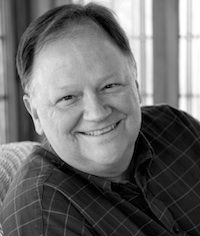Duncan describes impact of Unarmed Civilian Protection
Press Clip Source: Midland Daily News
Date: October 27,2015
Written by: Ralph E. Wirtz
Read original article: Here
 Suppose for a moment that your mere presence in a room or a field or at a campground could save a life, stop a rape or prevent an abduction.
Suppose for a moment that your mere presence in a room or a field or at a campground could save a life, stop a rape or prevent an abduction.
The globe-trotting Mel Duncan was at Delta College Monday night, telling those in attendance that this supposition is true, and that there are people in more than 50 organizations from 35 nations around the world doing those things, protecting civilians just by being in areas where violence is occurring. Unarmed Civilian Protection is a new phenomenom, a one-generation method of responding to violence, he said.
Duncan is co-founder of Nonviolent Peaceforce, one of those 50 organizations, and he offered proof that the idea is working. He said the primary work of his organization is to “protect civilians from imminent violence.” Teams of unarmed, trained professionals respond in areas where they are wanted. They are nonpartisan and nonviolent and they “live and work in the communities where conflict is,” Duncan said.
“While we are there, our specific and only job is the protection of civilians, to work with local civilian society to deter violence and to help strengthen the peace infrastructures,” he said.
The need for finding ways to resolve conflicts peacefully is growing, Duncan said, citing a report from the United Nations Panel on Global Climate Change that stated “the worst is yet to come.” Duncan said climate disruption exacerbates violent conflict.
“Today, more people are affected by conflict and disaster more frequently and for longer periods than in previous decades and that number in need of humanitarian assistance and protection has nearly doubled in the past decade,” Duncan said. “We now have 60 million of us who are in direct need of shelter and refuge because of violent conflict and persecution.”
One example he cited was NP’s work in South Sudan. There, in the midst of civil war, more than 4 million people are displaced and many live in “protection of civilian areas.”
“These are not called camps because that would dignify the conditions too much, but people fled there when violence broke out for some semblance of protection based upon proximity to UN compounds,” Duncan said.
Every day, women would have to leave the area for water, sorghum and firewood, and every day rebel soldiers and militias lurking outside the area would routinely gang rape the women.
What NP found is that if two or three workers accompanied the women outside the area, the gang rapes stopped. He said NP has done this more than 1,000 times in the past 14 months, and “never once has one woman been bothered.”
He cited NP’s work in Sri Lanka, Guatemala and the Philippines as other examples.
“My main goal tonight is to spark your moral imaginations,” Duncan said. “That when you hear about the next atrocity against civilians and then you hear ‘we can either stand back and do nothing or we can send in the bombers and the drones and the soldiers,’ that there is a lot of room in between. That once someone says ‘we would like to do this but our only choice is this,’ that is when you engage your moral imaginations, and say ‘let’s look at the options.’ Violence comes when options are cut off. And it is up to us, especially the students here, to invent, to create, to question, what those options are. ”
Duncan had the audience participate in the first part of his lecture, an exercise he called a “human graph.”
He asked audience members to go to one side of the room or the other based upon their feelings about three statements. The first was “My country will be at war throughout my lifetime.” Most people, particularly who have spent most of their lifetime reading about the wars in Afghanistan and Iraq, agreed with that statement.
That, he said, shows the need to think more deeply and more clearly about peaceful solutions to conflict.
“Because I for one … am very, very sad to see so many young people agree with ‘for the rest of my life my country will be at war,’ accepting the state of perpetual war. It doesn’t have to be that way,” Duncan said.
Everyone can participate, he said. Those people not directly on NP teams can conduct and sponsor research on nonviolent approaches to conflict; they can teach about unarmed civilian protection and other alternatives; they can be interns in the NP; they can offer courses at colleges and universities; they can raise money and, finally, they can find new approaches to conflict resolution.
The program was sponsored by Delta’s Global Awareness Program, its Global Peace Studies Program, the Helen M. Casey Center for Nonviolence and the Midland Chapter of Nonviolent Peaceforce.
